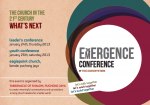Fred makes the salient point that Gigliogate and the Chik-fil-A fustercluck are basically the same. Evangelicals wade into the public square, air our their opinion on a social issue, take a beating in said public square, and then crawl back into their holes, wailing that they’ve been discriminated against.
Well, Christian Smith predicted all of this.
Smith did all of us who follow American evangelicalism a great service with his 1998 book, American Evangelicalism: Embattled and Thriving. Therein, he described how evangelicals have developed a “sub-cultural identity,” wherein they told themselves a story about their own position as an embattled minority, even as they became the most powerful bloc in our society.
One of the biggest problems facing contemporary sociologists, especially since the collapse of the secularization thesis, has been if and how religion can survive in a pluralistic/postmodern context. Several theses have been proposed, including 1) the sheltered enclave or “sacred canopy theory” (Peter Berger, James Davidson Hunter), 2) status discontent theory (Richard Hofstadter, Joseph Gusfield), 3) strictness theory (Dean Kelly, Laurence Iannaccone), and 4) competitive marketing theory (Roger Finke, Rodney Stark).
Smith offers a look at the one strand American religion that seems to be vibrant in the pluralistic American context, and that is evangelicalism.
The Good
By a set of six sociological measurements (including robustness of faith, saliency of faith, and participation), evangelicalism is indeed thriving. Smith and his team performed the most massive empirical study of evangelicalism ever done, including 2,591 telephone surveys, followed up by hundreds of face-to-face interviews and dozens of church visits. The results show conclusively that evangelicalism is doing well in America — that is, its adherents are committed to it, and it is growing.
The Bad
The reason that evangelicalism is thriving is that it has, since the evangelical-fundamentalist split of the 1940s, developed a relationship of “difference, engagement, tension, conflict, and threat.” One one end of the spectrum, fundamentalists have withdrawn from culture, developed a retreatist attitude (see comments, for example, homeschooling), and are have not negotiated a sustaining relationship with culture. Mainline and liberal Christians (Protestant and Catholic alike) are accomodationist, and there is simply not enough difference between them and culture to make a difference to much of anyone. In other words, why join something that looks exactly like what you’re already a part of? All three — fundamentalists, liberals, and mainliners — scored significantly lower that evangelicals in all six characteristics of strength.
Smith then proposes a sub-cultural identity theory of religious strength in the face of pluralism. “In a pluralistic society, those religious groups will be relatively stronger which better possess and employ the cultural tools needed to create both clear distinction from and significant engagement and tension with other relevant outgroups, short of becoming genuinely countercultural.” Those are the very tools that evangelicalism has employed, and this has led to a love-hate relationship with culture.
For instance, evangelicals rail against the secular media, and yet they relish every possibility to get a major evangelical figure on Piers Morgan. They repudiate modern rock and rap music, yet they relish contemporary Christian music which is wholly owned by the same mammoth corporations that own the secular labels. You get the picture.
The Ugly
Smith goes on to conclude that the very thing which makes evangelicalism strong in a pluralistic society also dooms it to failure in making any kind of positive change in that society. That is, evangelicalism will never achieve its goals for the redemption of society because the tools in its toolkit don’t work on societies.
For example, evangelicals have an atomistic view of society. In other words, they see society as nothing more than the sum of the individuals who make it up. When asked about social problems, evangelicals overwhelmingly state the answer to these problems is personal relationship. Here’s the theory: if a father is beating his kids, a Christian man should befriend that man, and lead him to Christ, then he’ll stop beating his kids; and once we do that with every child abuser, then the problem of child abuse will vanish from our society. One of the obvious problems with this line of reasoning is that child abuse, alcoholism, divorce, etc. are just as prevalent (or more) among evangelicals as among any other group.
When confronted with the obvious lunacy of this logic, the evangelicals interviewed had a hard time seeing that it was a problem, and when they did, they were often left speechless as to any other response to a social problem (several interviews are printed in the book).
For another example, when polled, the very things that evangelicals are most proud of about evangelicalism are the things most hated by non-evangelicals — not a ringing endorsement from those the evangelicals are trying to convince.
Finally, it actually serves evangelicalism’s purposes to have this conflictual relationship with culture. If culture gets more and more evangelical, then evangelicalism will no longer be a distinct sub-group and, like mainliners and liberals did a couple decades ago, they would gradually lose their identity.
Some might even say that we’re watching that very thing happen right now. Others, myself included, think the opposite: the sub-cultural identity of evangelicals still raises ire and money, but more and more young evangelicals are tired of all the fighting, and they’re simply opting out of the evangelical church.












